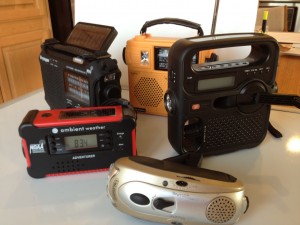Emergency Supply Kit — Portable Radio
A wide-spread emergency can result in a power outage that lasts for days or even weeks. Over that entire time, if you’re on your own, you’ll need an emergency radio — or perhaps more than one — to know what is happening outside your immediate area.
What’s the best radio for emergency purposes?
The photo below shows five radios that we have purchased and tested; find our comparison of these five emergency radios here. (Guess which one of the radios is a dud!)
What follows are the basics for any radio you decide to put in your emergency supply kit.
A portable AM radio will be your lifeline.

Which radio should you choose?
Local emergency services and radio stations will be broadcasting news that you will want. Be sure you know what channel they’ll be using! (Put a label on each radio.)
— Evacuation plans: schedules, staging areas, different routes, location and status of available shelters
— Weather reports: temperatures, anticipated rain and/or winds
— Location of areas to avoid: “hotspots,” traffic jams, roadblocks
— Announcements from Police, Fire or other emergency services
Generally, all the above notifications will be broadcast over the AM band. FM and television signals are “line of sight,” so they can get blocked by tall buildings, mountains, etc., and usually dissipate after about 50-75 miles. AM signals, on the other hand, can bounce off the ionosphere and travel much further (even all the way around the earth!). So, in an emergency situation, you want a strong AM radio so you can tune in to local emergency transmissions.
Your radio needs to work for days or even weeks.
In a power outage, your radio won’t work by being plugged into the wall. It will need an additional source of power – typically batteries. When they wear out, how will they be re-charged?
- Replace the batteries with new ones from your supplies. Obviously, you have to have plenty of the right size: AAA, AA, D, C, etc.
- Recharge “rechargeable” batteries using a hand crank and generator, built into the radio.
- Recharge the batteries using solar power, either built into the radio or attached as a separate panel.
What combination of features will work best for you?
Check out our Emergency Radio Review. It has a series of questions that will help you select exactly what you need. It also identifies the one radio in the group above that you should NOT buy!
Virginia
Your Emergency Plan Guide Team
